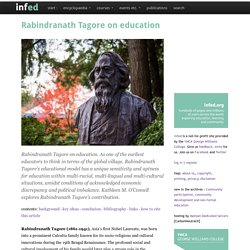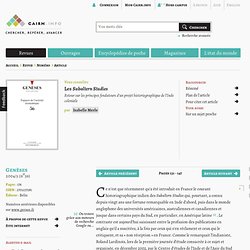

Subaltern Studies and Capital. Bibtex Endnote Google Scholar Print Email Vivek Chibber's critique (Postcolonial Theory and the Spectre of Capital) of the Subaltern Studies school deals largely with the early work of three authors - Ranajit Guha, Dipesh Chakrabarty and Partha Chatterjee.

Partha Chatterjee (pc281@columbia.edu) is a Founder Member of the Subaltern Studies Collective and lives in Kolkata This is the text of a presentation made at a panel on “Marxism and the Legacy of Subaltern Studies” at the Historical Materialism Conference at New York University on 28 April 2013. 062103. Cheikh%20Anta%20Diop%20-%20Precolonial%20Black%20Africa. Cadiop1. Cheikh_anta_diop_philo_science. With Amin Maalouf. Subaltern Studies and Capital. Subaltern. Rabindranath Tagore on education. Contents: background · key ideas · conclusion · bibliography · links · how to cite this article Rabindranath Tagore (1861-1941), Asia’s first Nobel Laureate, was born into a prominent Calcutta family known for its socio-religious and cultural innovations during the 19th Bengal Renaissance.

The profound social and cultural involvement of his family would later play a strong role in the formulation of Rabindranath’s educational priorities. His grandfather Dwarkanath was involved in supporting medical facilities, educational institutions and the arts, and he fought for religious and social reform and the establishment of a free press. His father was also a leader in social and religious reform, who encouraged a multi-cultural exchange in the family mansion Jorasanko. Within the joint family, Rabindranath’s thirteen brothers and sisters were mathematicians, journalists, novelists, musicians, artists. Key ideas We have come to this world to accept it, not merely to know it. Conclusion Links. Les Subaltern Studies. Notes On trouve grâce aux moteurs de recherche Google ou Altavista (États-Unis, Australie, Canada) un impressionnant répertoire bibliographique en anglais des articles et ouvrages écrits par les membres du groupe des Subaltern Studies ainsi que les nombreux textes afférents.

Voir, par exemple : www.untimelypast.org, www.lib.virginia.edu, www.clas.ufl.edu. Pour l’Amérique latine, on consultera entre autres, Ilean Rodriguez (éd.), The Latin American Subaltern Studies Reader, Duke, Duke Universty Press, 2001 ainsi que Saurabh Dube (éd.), Pasados Poscoloniales. Coleccion de ensayos sobre la nueva historia y etnografia de la India, Mexico, El Colegio de Mexico, 1999. La raison des plus faibles: rapport au travail, écritures domestiques et ... - Bernard Lahire.
Penser la "crise des banlieues" Que peuvent les sciences sociales ? 03 - Conférence de François Georgeon: le califat ottoman - EHESS. 03 - Conférence de François Georgeon: le califat ottoman Conférence de François Georgeon, directeur de recherche émérite au CNRS.

Thème: le califat ottoman Direction de l’Audiovisuel/EHESS/IISMM Auteur/Réalisateur : Philippe Kergraisse Vidéothèque : Institut d’études de l’islam et des sociétés du monde musulman - Ecole des hautes études en sciences sociales, en partenariat avec le Collège de France Jusqu'à la révolution kémaliste, le souverain ottoman était à la fois sultan de l'Empire ottoman et calife de tous les musulmans. Mustafa Kemal fit abolir le sultanat en 1922 puis le califat en 1924, mettant un terme à l'existence d'une autorité suprême, juridiquement établie, dans l'islam sunnite. L'importance des 5 sens, des intelligences sensorielles. Comment votre cerveau fonctionne vraiment (Graphique interactif) No matter how much you learn about yourself or your industry, the driving force behind so much of it remains a mystery -- your brain.

The magnificent machine conducts basic functions like feeling pain and experiencing your senses, but is also responsible for complex and remarkable things like your personality and how you store and process language and memories. While there is much that scientists still don't know about the human brain, there is a lot that we do know. Check out this interactive graphic of the human brain created by OpenColleges, an Australian online education site. Click around and learn more about your internal computer. Sommes-nous câblés pour argumenter. Par Rémi Sussan le 27/06/12 | 14 commentaires | 2,483 lectures | Impression Cette irrationalité inhérente à l’esprit humain, dont nous avons déjà présenté plusieurs aspects dans nos colonnes, d’où vient-elle ?

Si la raison a été réellement développée pour nous permettre de résoudre des problèmes complexes, elle aurait dû se montrer plus efficace. C’est le lièvre que soulève un article du New Scientist (réservé aux abonnés, mais ses sources sont disponibles en ligne). La réponse la plus évidente est que la raison n’a pas pour but de trouver des solutions. Le raisonnement sert-il d’abord à convaincre ? Fondamentalement, nous explique-t-on, l’homme est un animal social dont l’intelligence a évolué au sein d’un groupe. Afin de l’emporter dans le débat, certains biais propres à notre fonctionnement mental se seraient particulièrement développés. Un autre exemple cité par le New Scientist est la façon dont nous sommes sensibles à la manière dont les arguments sont présentés. Des biais innés ? Subalter.